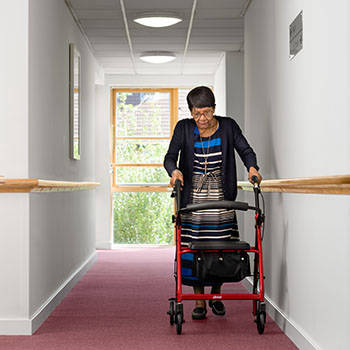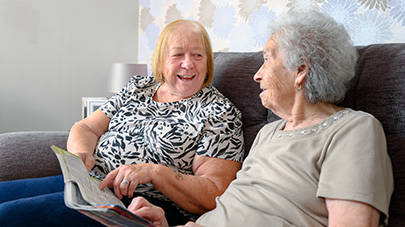- Home
- Guides & support
- What is a care needs assessment?
Last updated 17 December 2025
What is a care needs assessment?
If you feel that you need some extra help with everyday life as you get older, a care needs assessment is one of the first steps towards getting support.
Provided for free by the local council, this process is about more than just determining what kind of support is required. It’s about understanding the unique challenges an individual faces day-to-day and looking at how they could receive care and support to help them improve their quality of life.
 Whether you’re considering seeking support for yourself or a loved one, understanding what a care needs assessment entails can give you peace of mind and help you feel confident in your decision to speak to someone about changes you’ve noticed and the concerns you have. This guide will explain everything you need to know about care needs assessments, from who conducts them to how they work and what happens next.
Whether you’re considering seeking support for yourself or a loved one, understanding what a care needs assessment entails can give you peace of mind and help you feel confident in your decision to speak to someone about changes you’ve noticed and the concerns you have. This guide will explain everything you need to know about care needs assessments, from who conducts them to how they work and what happens next.
In this guide you’ll find:
- What is a care needs assessment for
- How to get a care needs assessment
- Care needs assessment questions
- How are the outcomes of the care assessment used
- Eligibility criteria: Who qualifies for care and support?
- Does the care assessment include financial considerations?
- What if the assessment decision is disputed?
- The role of family and advocates in the care assessment process
- Care from Anchor
What is a care needs assessment for?
The primary purpose of a care needs assessment is to understand an individual’s needs so that appropriate support can be offered. It’s your chance to talk about the care you need and the things you are finding challenging with a social care professional.
It’s designed to be a detailed and compassionate evaluation of a person’s physical, emotional, and social circumstances. The assessment helps identify the type and level of care required, whether that’s assistance with basic daily tasks like dressing and preparing food or more specialised care like support with mobility.
The assessment is about improving quality of life and providing care that supports the person’s independence, dignity, and wellbeing.
How to get a care needs assessment
Social services or local authorities typically conduct care needs assessments, they are often led by a trained social worker or another care professional.
Anyone over the age of 18 who appears to need care and support can request a care needs assessment, regardless of income, savings, or the complexity of their needs. Simply contact the adult social services department of your local council and ask for a care needs assessment.
 The process is always intended to be supportive, compassionate, and tailored to the individual’s needs. The assessor’s job is to listen carefully, understand the person's challenges, and help them find the care and support that will work best for them. Whether the care needed is temporary or long-term, at home or in a residential care setting, the assessor will guide the person through the process with respect and understanding.
The process is always intended to be supportive, compassionate, and tailored to the individual’s needs. The assessor’s job is to listen carefully, understand the person's challenges, and help them find the care and support that will work best for them. Whether the care needed is temporary or long-term, at home or in a residential care setting, the assessor will guide the person through the process with respect and understanding.
They’re there to support individuals and families, helping to find the right solutions during what can often feel like a confusing time.
Care needs assessment questions
A detailed discussion with the assessor will look at:
- Daily living: How the person manages personal care tasks like dressing, eating, or bathing.
- Mobility: Whether they can move around safely and if any support is required.
- Mental health: Understanding the emotional and psychological wellbeing of the person, this can include discussing conditions such as dementia where relevant.
- Social needs: How isolated or connected the person is, and if they require support to engage with the community.
This conversation aims to understand the physical aspects and the emotional and social challenges that can impact a person's day-to-day life. The assessor will listen, empathise and guide the discussion based on the person’s needs, preferences, and goals.
The person being assessed is always at the centre of this conversation, their preferences and wishes for their future will be discussed in detail and the assessor will work alongside them to consider their options.
How are the outcomes of the care assessment used?
A personalised care plan will be created once the care needs assessment is complete.
What is a care plan?
A care plan, also known as a care and support plan, is a blueprint for how an individual’s needs will be met, whether through support at home, extra care housing, or moving into a care home.
It is a written document that takes into account the assessment outcomes and puts forward services that can meet the person’s needs, giving them the best chance to live as comfortably and independently as possible.
A care plan is designed to be flexible, adjusting as the individual’s needs change over time. It can be reviewed regularly to check what's working and what is not.
If eligible for care, the local authority will support organising the required services and guide families through available options.
Learning more about your support options
If you have no experience of the care system you may not be aware of the different types of support available in your local area, and not know what to expect from your care plan.
While the right choice for some people finding it hard to live independently, moving to a residential care home is not the only option available as we get older.
If you have been starting to question the suitability of your current home, you may find it useful to learn more about the different types of supportive accommodation available to people in later life. When preparing for a care needs assessment you may also want to consider whether a care home is the right move for you.
Eligibility criteria: Who qualifies for care and support?
 The individual’s needs and their ability to manage daily life determine a person’s eligibility for care and support.
The individual’s needs and their ability to manage daily life determine a person’s eligibility for care and support.
Local authorities assess whether a person’s health and care needs are significant enough to require support. This means they will look at:
- Daily living tasks: Can the individual dress, eat, and bathe without assistance?
- Health conditions: Does their physical or mental health affect their abilities?
- Social isolation: Can the individual engage with others, or do they need extra support for social interaction?
- Safety: Are there any risks that make independent living challenging?
Individuals with higher care needs or those who require specialist support are more likely to qualify for financial assistance and more structured care. However, even those with lower level care needs can often access some support, whether through local community services, home care, or other options.
Does the care assessment include financial considerations?
Although a care needs assessment doesn’t directly involve a conversation about finances, the cost of care and how elements of the care plan will be paid for are naturally part of this process to secure extra support.
Following the care needs assessment, a separate financial assessment will determine whether the individual can contribute to the cost of their care.
This financial assessment will take into account the individual’s income (including pensions and benefits) and capital such as savings, property and investments. All of this information will be used to decide how much they can afford to pay towards the cost of their care and how much the council will contribute.
If you want more details on paying care home costs check out our information on care home fees and funding assistance.
What if the assessment decision is disputed?
It’s natural to feel concerned or unsure about the outcome of a care needs assessment, especially when it involves crucial decisions about you or your loved one’s future. If you disagree with the assessment's decision, you have the right to challenge it.
The first step is to request a review of the assessment. You can also ask for a second opinion or an independent advocate to assist in reviewing the decision. Local authorities usually guide you through this process, offering reassurance and support. If necessary, there may be options for formal legal changes.
The role of family and advocates in the care assessment process
 Family members and advocates are essential throughout the care needs assessment process. They can offer emotional support, help communicate needs and help ensure conversations keep the individual’s best interests at heart.
Family members and advocates are essential throughout the care needs assessment process. They can offer emotional support, help communicate needs and help ensure conversations keep the individual’s best interests at heart.
Advocates can provide expert advice, speak up on your behalf and help you navigate the sometimes complex procedures involved in securing care.
Family members can also be present during the assessment to provide additional context and support, ensuring that every need is considered and the person’s wishes are respected. Together, family and advocates can play an invaluable role in helping individuals access the care they need.
Care from Anchor
A care needs assessment is the first step toward ensuring that you or a loved one gets the necessary support to continue to live a fulfilling life.
If your assessment and care plan suggests one of the services we offer at Anchor is best for you or your loved one, you can rest assured that our friendly teams will guide you through every step of the move.
Whether you are facing this journey for yourself or someone close to you, know that help is available, and you don’t have to go through it alone.
In both our extra care housing and residential care homes the teams are used to answering a range of questions and supporting people with both temporary stays and permanent moves. They will be happy to discuss your next steps with you in detail to make sure you and your loved one know exactly what to expect and feel confident, safe and welcomed when coming to live with us.
Find your perfect property
Guides on making decisions and moving
This website uses cookies which track activity so that you get the best possible experience. By continuing to use this website we will assume you are happy and cookies will be set. You can change your cookie settings at any time.



















